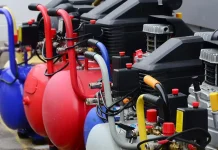Industrial coating is a crucial component in various industries, providing protection, durability, and aesthetic value to surfaces and structures. From safeguarding machinery to enhancing the longevity of infrastructure, industrial coating plays a significant role in maintaining the functionality and appearance of materials exposed to harsh environments. This article delves into the types, benefits, and applications of industrial coating.
What is Industrial Coating?
Industrial coating refers to a specialized layer of material applied to surfaces such as metals, concrete, or polymers to protect them from environmental factors like corrosion, wear, and chemical exposure. These coatings are engineered to withstand extreme conditions while maintaining their integrity and performance.
Types of Industrial Coating
- Epoxy Coatings
Epoxy coatings are highly durable and resistant to abrasion, chemicals, and moisture. Commonly used in industrial and marine environments, they are ideal for protecting metal surfaces, pipelines, and storage tanks. - Polyurethane Coatings
Known for their flexibility and UV resistance, polyurethane coatings are often used in outdoor applications. They provide excellent gloss retention and are widely applied to floors, machinery, and equipment. - Powder Coatings
Powder coatings are an environmentally friendly option, offering a smooth finish without solvents. They are commonly used in automotive, appliances, and furniture industries due to their durability and aesthetic appeal. - Ceramic Coatings
Ceramic coatings provide superior heat and chemical resistance. They are often employed in industries such as aerospace and automotive for components exposed to high temperatures. - Intumescent Coatings
Intumescent coatings expand when exposed to heat, forming a protective barrier against fire. These coatings are critical for fireproofing steel structures in construction and industrial facilities.
Key Benefits of Industrial Coating
- Corrosion Protection
Industrial coating creates a protective barrier against moisture, oxygen, and corrosive chemicals, significantly extending the life of materials. - Enhanced Durability
By resisting wear and tear, industrial coatings reduce maintenance costs and ensure long-term reliability of equipment and structures. - Improved Safety
Coatings such as non-slip or fire-resistant types contribute to workplace safety by mitigating risks. - Aesthetic Improvement
Industrial coatings offer a polished and professional appearance, improving the visual appeal of surfaces. - Environmental Resistance
Advanced coatings are designed to withstand UV exposure, extreme temperatures, and chemical spills, making them suitable for diverse applications.
Applications of Industrial Coating
- Construction
Industrial coatings are used on bridges, pipelines, and structural steel to protect against environmental damage and ensure structural integrity. - Manufacturing
Coatings on machinery and tools prevent corrosion and wear, improving productivity and operational efficiency. - Oil and Gas
Pipelines, storage tanks, and offshore platforms rely on industrial coatings to resist harsh chemical and marine conditions. - Automotive Industry
Industrial coatings are applied to car components to enhance durability, reduce friction, and improve appearance. - Aerospace
Aircraft parts are coated with materials that provide thermal resistance and reduce drag for improved performance.
Future Trends in Industrial Coating
The industrial coating industry is evolving with advancements in nanotechnology, environmentally friendly formulations, and smart coatings that can self-heal or change properties based on external stimuli. These innovations aim to improve efficiency and sustainability while meeting the growing demands of various sectors.
Conclusion
Industrial coating is more than just a protective layer; it is an essential part of industrial operations that ensures the longevity, efficiency, and safety of materials and structures. With a wide range of types and applications, industrial coating continues to be a cornerstone of modern industry, enabling advancements in technology and infrastructure.










